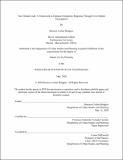| dc.contributor.advisor | Gabriella Yolanda Carolini. | en_US |
| dc.contributor.author | Bridgers, Braxton Corbin. | en_US |
| dc.contributor.other | Massachusetts Institute of Technology. Department of Urban Studies and Planning. | en_US |
| dc.date.accessioned | 2020-09-15T22:05:02Z | |
| dc.date.available | 2020-09-15T22:05:02Z | |
| dc.date.copyright | 2020 | en_US |
| dc.date.issued | 2020 | en_US |
| dc.identifier.uri | https://hdl.handle.net/1721.1/127586 | |
| dc.description | Thesis: M.C.P., Massachusetts Institute of Technology, Department of Urban Studies and Planning, May, 2020 | en_US |
| dc.description | Cataloged from the official PDF of thesis. | en_US |
| dc.description | Includes bibliographical references (pages 39-53). | en_US |
| dc.description.abstract | As the climate crisis continues to exacerbate the frequency and scale of severe weather events, emergency management professionals (EMPs)--responders and managers in charge of mitigation, preparedness, response, and recovery activities related to disasters--are adapting by leveraging digital technologies meant to enhance operations. In tandem with the trends stated above, civic technologists--individuals interested in developing tech to enhance government-citizen relations--have sought to assist EMPs and residents alike during disasters by building digital tools which utilize publicly available and crowdsourced data. However, while the efficacy of such tools have been praised within the public sector, there currently lacks a general framework for local governments to plan for and implement civic participation through the development of digital infrastructure for emergency management purposes. Through semi-structured interviews with key informants and a critical analysis and document review of public-facing primary sources, this thesis presents a framework within which cities can integrate the work of civic technologists within their emergency management processes toward more resilient urban communities in the face of the climate crises. | en_US |
| dc.description.statementofresponsibility | by Braxton Corbin Bridgers. | en_US |
| dc.format.extent | 53 pages | en_US |
| dc.language.iso | eng | en_US |
| dc.publisher | Massachusetts Institute of Technology | en_US |
| dc.rights | MIT theses may be protected by copyright. Please reuse MIT thesis content according to the MIT Libraries Permissions Policy, which is available through the URL provided. | en_US |
| dc.rights.uri | http://dspace.mit.edu/handle/1721.1/7582 | en_US |
| dc.subject | Urban Studies and Planning. | en_US |
| dc.title | The climate code : a framework to enhance emergency response through civic digital participation | en_US |
| dc.title.alternative | Framework to enhance emergency response through civic digital participation | en_US |
| dc.type | Thesis | en_US |
| dc.description.degree | M.C.P. | en_US |
| dc.contributor.department | Massachusetts Institute of Technology. Department of Urban Studies and Planning | en_US |
| dc.identifier.oclc | 1193555659 | en_US |
| dc.description.collection | M.C.P. Massachusetts Institute of Technology, Department of Urban Studies and Planning | en_US |
| dspace.imported | 2020-09-15T22:05:02Z | en_US |
| mit.thesis.degree | Master | en_US |
| mit.thesis.department | UrbStud | en_US |
